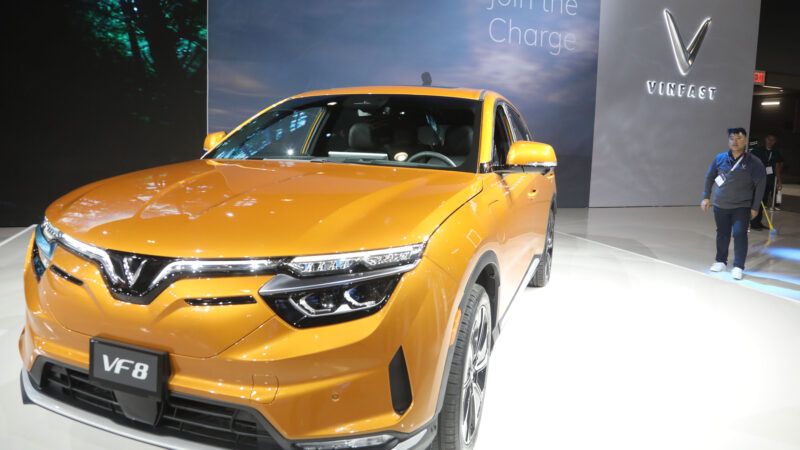VinFast Delays Production After North Carolina Seizes Property for Factory Site
North Carolina taxpayers have already spent over $96 million on the site, while state officials have seized multiple private properties.

VinFast, a Vietnamese automaker that builds electric vehicles, announced in July that it would not begin production at its North Carolina plant for another four years. While the news is certainly a setback, the disappointment is compounded by the fact that the state is trying to bulldoze a number of private homes, and a church, to make the project happen.
In March 2022, North Carolina Gov. Roy Cooper announced that VinFast would build its first North American plant in Chatham County. The company would spend $4 billion and create 7,500 jobs, with production from the completed factory set to begin in July 2024. At its peak, the facility would be capable of producing 150,000 vehicles per year.
In exchange, North Carolina lawmakers agreed to give the company $1.25 billion in incentives, including $450 million for infrastructure, including "roadway improvements" and building out the water and sewer capacity; $400 million from the county; and a $316 million state grant paid out over 32 years, linked to the company's job creation promises. In effect, North Carolina taxpayers would be financing over 30 percent of the project.
President Joe Biden called the project "the latest example of my economic strategy at work." CNBC lauded the state's Democratic governor and Republican Legislature for "managing to put aside their very deep political divisions to boost business and the economy" when it named North Carolina America's Top State for Business.
But within two years, the deal was on shaky ground. The company announced in March 2023 that it would not be able to begin production at the factory until at least 2025 "because we need more time to complete administrative procedures," according to a company spokesperson.
Then in July 2024, in a press release about manufacturing output in the previous quarter, VinFast announced that it had "made the strategic decision to adjust the timeline for the launch of its North Carolina manufacturing facility, which is now expected to begin production in 2028," in order to "optimize its capital allocation and manage its short-term spending more effectively."
While this is disappointing news for many—company executives, shareholders, North Carolina state officials—it's worse for residents in the area.
Many of the state and county incentives are dependent upon VinFast meeting certain metrics: While the state doled out $125 million to reimburse the company for site preparation costs, it can claw back that entire amount if VinFast fails to hire at least 3,875 people—just over 50 percent of the required total. There are further clawback provisions if it doesn't hire at least 6,000 people and doesn't invest at least $2 billion into the project.
But even if the deal falls apart and the state gets its money back, some things can't be undone. As part of the deal, the North Carolina Department of Transportation (NCDOT) would conduct "roadway improvements" at the future site of the facility. As detailed in an August 2022 project overview, "private property is needed to construct the improvements proposed by the roadway project." And while the NCDOT "works to minimize impacts such as the number of homes and businesses displaced by a road project, some impacts are unavoidable."
In total, the state expected that the roadwork would "impact" five businesses, 27 homes, and Merry Oaks Baptist Church, which had stood since 1888. This meant the state was authorized to purchase the properties from the owners—or if the owners refused to sell, the state could simply take the properties through eminent domain.
Eminent domain, authorized by the Takings Clause of the Fifth Amendment, allows government entities to seize private property for public use, as long as the owner receives "just compensation." Of course, the only thing that separates this from a normal real estate transaction is that the use of eminent domain implies that the property owner did not want to sell but was forced to anyway.
While an electric car factory does not qualify as a "public use," the state is planning to bulldoze the houses, businesses, and church to make way for a new roadway interchange that will accommodate traffic to and from the site. Of course, under the U.S. Supreme Court's 2005 decision in Kelo v. New London, the state would also have been justified to seize property to give to a purely private party, with Justice John Paul Stevens writing that "there is no basis for exempting economic development from our traditionally broad understanding of public purpose."
In fact, that seems to be just what happened: In July, after VinFast announced its latest delay, the Raleigh News & Observer reported that so far the state had spent $96 million—nearly all of it on site preparation and infrastructure—and purchased four homes, with negotiations ongoing with other homeowners and two businesses. And sadly, "North Carolina has acquired two businesses and Merry Oaks Baptist Church through eminent domain, meaning negotiations fell short and the state took over the land after paying the previous owners fair market values assessed by a state-approved appraiser."
In July 2023, VinFast offered to donate up to three acres of land from its 2,000-acre parcel to Merry Oaks Baptist Church so the congregation could relocate. But a better solution would have been for VinFast to simply shoulder the burden of development in the first place, first by footing the bill for the project itself and then by obtaining land where the government did not forcibly remove any obstacles in the way.


Show Comments (21)